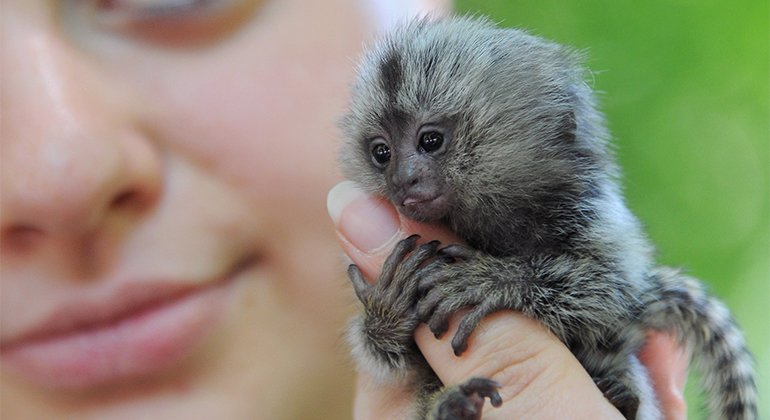
Keeping a monkey as a pet is not the same as caring for most other pets. A well-cared-for monkey can generally live between 20 and 40 years and will need your full devotion throughout its life. Cute babies grow into difficult adult monkeys and generally do not make good pets.
We analyze the challenges that come with keeping a monkey as a pet, including behavioral, medical, and legal issues you may encounter.
Monkeys do not grow up and become adults like human children. They are basically eternal toddlers. Pet monkeys also may not take well to new people in your life, including spouses and children, and they make it difficult to go on vacation. Additionally, finding a new home for the monkey is extremely difficult and psychologically stressful for the monkey.
Additionally, a monkey needs a lot of social interaction. A pet monkey that is deprived of your time and attention is likely to develop not only severe behavioral problems such as screaming and biting, but also psychological problems that can be difficult to correct.

Where you live, keeping primates like monkeys may be illegal. Countries around the world have different laws regarding keeping monkeys as pets. If you live in the United States, check your state and local laws to see if you can keep a pet monkey. Some states outright prohibit keeping monkeys as pets, others allow it, and others may have certain restrictions and requirements. And if owning a monkey is legal, permits may still be required. Sometimes permit holders must conduct home inspections to ensure proper facilities and care are provided.
Additionally, homeowners may require additional liability insurance, or some insurance companies may cancel your policy altogether if they find out you have a monkey. However, if you don’t have insurance, you are at risk if your monkey bites someone.
In addition to the high cost of keeping a monkey as a pet, these animals are also expensive when purchased from reputable sources. Costs vary depending on the type of monkey. For example, capuchin monkeys can cost $5,000 to $7,000, while a chimpanzee can cost $50,000.
In general, monkeys can live 20 to 40 years, so they are a long-term investment. A monkey’s life expectancy also depends on its species. A chimpanzee can live 50 years or more, while a capuchin monkey can live 15 to 25 years.
A sweet, affectionate baby monkey will eventually grow into the wild animal it was meant to be. Raising a monkey around humans will not change its wild nature, and monkeys as pets are never truly domesticated. In fact, depriving a monkey of normal social relationships with other monkeys can cause behavioral problems and neuroses.

Pet monkeys are often prone to biting (and they have 32 teeth to deliver those nasty bites). While some monkeys are gentle, others are very aggressive. Yet even the gentlest monkeys are unpredictable and can become aggressive toward anyone, including the person they are closest to, especially during and after puberty.
Monkeys need a large, secure enclosure, which can be expensive to build. They should spend time outdoors whenever possible. And they need to be provided with a wide variety of ever-changing toys and exercise equipment to keep them challenged, or they will become bored. Some states require certain types of enclosures to meet licensing requirements, but you should always have a place to house your monkey to keep him and the public safe.
Also, monkeys are not clean and tidy. Most cannot be effectively housetrained. Many young monkeys can be diapered or at least partially house trained, but this ability is often lost as they mature. Additionally, they may engage in unpleasant activities with their feces and urine (such as throwing it and painting with it). Aside from making a mess while toileting, pet monkeys can also be extremely mischievous and destructive, especially when bored.
Overall, Monkeys do not make good pets. Yes, some can be quite sweet for a while. But the reality is that monkeys can do too much damage and require too much care and attention to survive in a human household. These aspects are just as important in great apes (chimpanzees, orangutans, and gibbons). In short, nonhuman primates and humans do not make good roommates.